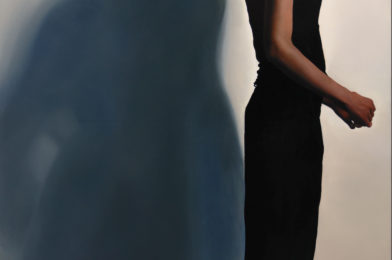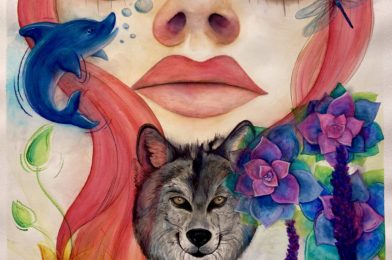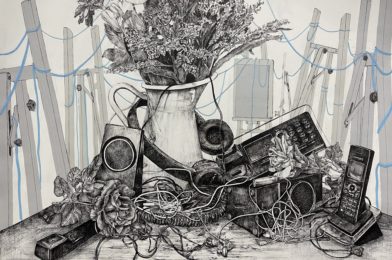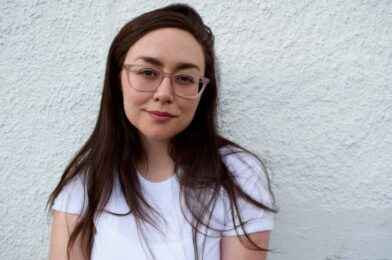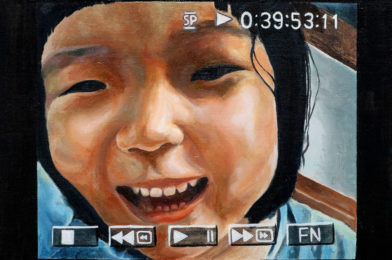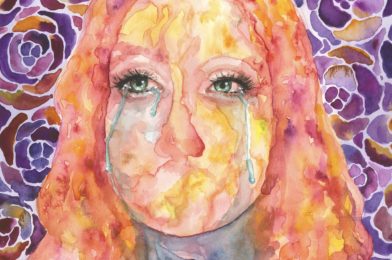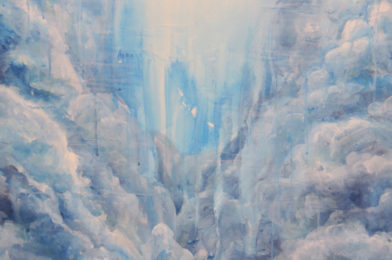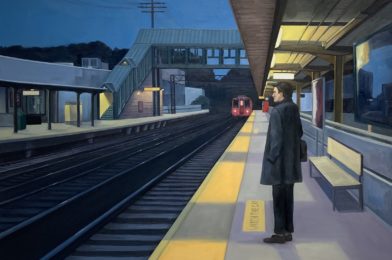Caylin Capra-Thomas is the author of the poetry collection Iguana Iguana (Deep Vellum Press 2022), as well as two poetry chapbooks, Inside My Electric City (YesYes Books 2017) and The Marilyn Letters (dancing girl press 2013). Her poems have appeared in journals including New England Review, Crazyhorse, Pleiades, Colorado Review, 32 Poems, Copper Nickel, Washington Square Review, and elsewhere. She has been awarded fellowships and residencies from the Vermont Studio Center and the Studios of Key West, and she was the 2018-2020 poet-in-residence at Idyllwild Arts Academy. She is currently a PhD student in poetry and nonfiction at the University of Missouri.
Following a master class with Caylin Capra-Thomas, Josephine Sporte and Inseo Yang sat down to ask questions about her experience writing Iguana, Iguana, her debut book of poetry.
1. How and when did you first get into writing? Why poetry?
I think I was always a writer. Even before I could write, I would dictate stories to my dad and make him write them down for me and staple them into little books. I started out, I would say, as a storyteller. I would make those little books, stand on the fireplace, and just force my family to listen to me tell totally insane, incoherent stories that were always very bloody for a little kid. Then, I was in sixth grade writing a novel in my notebook that was very tragic. Things really took off for me when I was an undergraduate and I started reading contemporary poetry because I really didn’t know that poets were alive. The poems that I read in English class in high school were mostly Robert Frost and some other dead white guys. So when I found out that there were poets still and that one could be a poet, that really changed things for me. Reading has always been a big influence on my own craft. So, I would say I’ve always written. I don’t even remember starting, so I don’t know why it happened, and I think poetry just sounds so good and feels so good. I really appreciate it as the medium that is most focused on distillation and the weight of each particular word, having a role to play and its own sort of sonic pleasure. I think the pleasure and the music of poetry are what drew me to it.
2. Since you got into writing by storytelling and writing a novel as a child, do you find a narrative thread to follow when writing poetry?
I think I tend to blend elements of lyric and narrative. I do appreciate having narrative moments in a poem. I think that they can be grounding and anchoring, to have somebody doing something or saying something somewhere, because a lot of times a poem can be this other animal– this esoteric, mystical experience. And,it’s just nice to be able to have something to hold onto while you’re reading. So, I appreciate poems with a narrative bent. I think that I have a number of poems that have narrative elements, but I don’t think that I necessarily sit down and say, this is a story that I want to tell. I tend to follow the poem to the extent that I can, to follow the music, which is something that I adapted from Richard Hugo, who wrote a book called The Triggering Town. He has this line where he says something to the effect of, “There are people who believe that truth should conform to music. And there are people who believe that music should conform to the truth.” What he was saying is that truth should conform to music, which is essentially saying, let what sounds good, let what gives you sonic pleasure be the driving force of the poem.
A poem isn’t nonfiction or fiction, but it’s this other thing that can blend elements of both. So if you are writing about a personal experience, if you are the “I” in the poem, the speaker, you can change that Honda to a Chevy if it sounds better. Nobody’s gonna come knocking on your door asking you why you lied about the Chevy. If you sit down and say, there’s a specific thing I want to say and I need to get the poem to sound good while it’s saying the specific thing, that can both be very challenging, and it can also kill off the possibility of what the poem might have become if you had just followed it and seen where it went. Because if you listen to the poem, follow the music, and make decisions informed both by sense-making narrative impulses and sonic pleasure, you can get to someplace unexpected. I think that’s often what I’m trying to figure out. I guess part of the reason why I don’t tend to sit down with a thing I want to say is because I don’t know. What I want to say in the poem is how I sort of translate myself to myself, and to others.
3. What is your advice for young poets who are trying to get published?
Don’t let the business end of things get you down. Trying to get published involves a lot of rejection, and that can be discouraging, but everyone experiences it. I’ve had a lot of rejection. I don’t know any writer who hasn’t. I think that fortifying yourself for the experience of rejection is important – and I know it sounds kind of cynical and defeatist. I don’t mean it to be. My hope is for new and young writers to stay in the joy of writing and stay with what brought them to poetry, or whatever it is that you write. And if the other stuff starts to cloud the thing that brought you to the joy of creation, put it aside for a little while and just try to find your way back to the part of it that nourishes you. Because if it’s not nourishing us anymore, why are we doing it?
Also, on the very practical level, I would also advise you to stay engaged with the literary landscape. Stay engaged with literary journals. There are so many literary journals out there. Find the ones that you like, read them, and see what they’re publishing. Is there a journal you love that you feel like your work would shine in, that you feel like your work would fit in? So on the practical level, just staying engaged with reading and the literary landscape can be really sustaining, because then you’re also participating in it.
4. I read in the interview you did with Poets&Writers that Iguana Iguana was completed over a seven-year period. How was it revisiting and revising the work you wrote in 2014? Were you constantly revisiting those works that they felt familiar enough, or did it feel like they were poems were written by strangers?
Strangers come up a lot in the collection. The idea of strangers, whether that is the stranger you encounter or the stranger that you are, or the stranger within, that idea was how I was finally able to access a through line and a coherent thread to bind the poems together. So that was probably the most important part of the process in it, going from being just a bunch of poems that I wrote over seven years into being something a little bit more cohesive as a book.
When I was revisiting some of those older poems, a lot of them had felt settled to me for a long time, partly because they had already been published. You can still revise a poem after it’s been published in a literary journal, but I had stopped thinking about them, and then when it came time to fit them into this new thematic thread that I had, I did have to change some of them. For example, there are a couple of poems that used to be in the second person addressed to a “you,” often to an ex or some sort of significant other. It wound up being the case that the book wasn’t about that kind of “you” anymore. It wasn’t about the people for whom some of the poems had originally been written. So I just took them out of the second person and put them into the first person. That made the poems kind of new and strange for me again. I think finding some little bit of strangeness within yourself, some little corner of your own soul that you didn’t know existed is one of the profound aspects of writing poems and also one of its pleasures. Some of the poems pretty easily transitioned to being about a singular “I.” Some of them I had to cut because they were very much about a relationship or another person, and they just didn’t fit anymore. So, there are plenty of poems that were in the original version of Iguana Iguana that are no longer included. And that was hard because they were poems that I liked and felt good about, but they just don’t exist in this book. And that’s okay.
5. We read a few of the poems in Iguana, Iguana, and we also read the poem titled “Iguana, Iguana” included in the book. Did you name the book after the poem? Why do they share the same name?
The collection had a couple of different titles. A third of the poems came from my MFA thesis manuscript. And so the book had the same title as I gave it when it was an MFA thesis manuscript for a while. That title was All Lit Things Predict Their Own Demise. I spent a little bit too long trying to make the book fit the title instead of trying to find a title that fit the book. Once I had this new lens for the collection, I really needed something that better reflected it. And so I had a couple of options. My editor, Sebastian Páramo, suggested Iguana, Iguana early on. And at first, I rejected it because I was like, it’s not really about iguanas! I wrote the poem Iguana, Iguana in Key West, and there are a couple of other Florida poems in there, but I didn’t want the book to be a Florida collection, since it’s a collection that was composed in many places. I was worried about a title that would constrict the way those places were reflected or compiled or something. But after a while and after a couple of other titles that just didn’t quite fit, I started thinking about the way the manuscript employs doubling, the idea of the alter ego as a double of the self that is not quite the self, the past life as something that is the self, but not quite the self. This kind of recursive action that the poems take, sort of moving a little bit forward and then doubling back in on themselves. Repetition comes up a lot in the poems. So the phrase “iguana, iguana,” just started to fit the themes of the book. Some people do think it’s about iguanas, and I just live with that. Somebody who bought it said he was buying it for his wife who worked with reptiles. I was like, “Okay, I don’t know what she’s gonna think of it – it’s not really like that, but cool!” So, it has become like a de facto mascot for the book, which is also really fun. I can just do two lizard emojis to refer to it in shorthand.
6. What part of you do you think inspired you to write about strangers and address strangers in your work?
On a very direct logistical level, I moved a lot over the course of the seven years that I spent writing this. I moved from Montana to Florida to Ohio to California, to Missouri. That meant that every year or two, I was a stranger all over again, introducing myself to new people again. I was constantly being made to reexamine myself from the outside. Also, I think that there’s also this infinitely mysterious core in all of us. We all have this kind of totally unknowable part of ourselves, which we start to know through art, poems, or whatever your self-expression is. We are all mysterious, even to ourselves in some ways, like when you write something that reveals something about your own mind or your own feelings. Like, oh, I didn’t realize I felt that way about this particular thing that happened 10 years ago. I think that there is a little stranger within all of us, who is strange even to us.
7. All right. So relating to the topic of home, having lived in Idyllwild for some time, did any of your experiences here make it into your writing? Which home of yours did you find the most impactful?
The poem “Knowing” on page 45 is Idyllwild scenery at its core. The poem starts, “I watched the fog pool in from where I stood on the path. I could see a dog, a lab mix, rush to his person on the field below, at my feet on the path, stood my own dog, meringue white, and all around us the fog, smoke-white and curling up like a French inhale.” I was coming down that path from Husch Field. Above Husch Field, fog would always settle otherworldly. I just had a moment and I was watching, I don’t remember who it was, somebody playing fetch with their dog. So that poem is very Idyllwild. “Whiteout” is also a poem that is very Idyllwild inspired. “Like something true, the snow came and obliterated the world. What I thought was the world – the pines, the sky, my wooden walls, the roads that take me away from myself, the walls, the pines.” The trees loomed pretty large in my psyche and my imagination about this place. And there was a wild snowstorm on Thanksgiving of 2019, and I think that’s when I wrote this poem. Idyllwild definitely makes it in.
I would say the place that feels the most impactful – I only lived in Florida for a few months, but the landscape was so drastically different from anywhere I’ve ever lived. Even though I didn’t particularly like the physical discomfort in Florida–I was always hot and sweaty– it was just a very strange place, which can stir up poems. Montana might have been the single most impactful place that shows up in the collection, because it’s where I started writing the book, and where I really found a wonderful writing community and learned a lot of what I semi-know about poems. I always feel kind of wary of saying I know anything about anything. But, to the extent that I know things about poems, that’s really where it solidified into something that feels like a body of knowledge. Any poem that has Massachusetts or Vermont, that’s where I grew up. So those are often poems of homesickness because that’s where my family still is. They were all impactful in their own way, but they made different kinds of impacts.
8. Are there any problems or projects you’re currently working on? And if you have one, how did Covid 19 affect your work?
It was a weird couple of years we had there. I was in Idyllwild when Covid started in March 2020. I said goodbye to the students I worked with, maybe on March 11th. We thought it was gonna be a five-week break and then I’d see them again. I was like, well, not goodbye. I’ll see you in April. That was false. And, I found it very difficult to write in those first few months, just because of so much psychic static over the news and the peril and the dying. So it was a little too intense for me to write much at that time.
When I left Idyllwild and moved to Missouri, I started working on prose poems, which is a form that I hadn’t really written much in before. Initially, they were poems of frustration and poems that dealt with the sort of existential despair that can come over one as a working artist in the world. I started writing them in the summer of 2020; it was a time when we were all questioning what our actions meant, what kind of care we owed ourselves, and what kind of care we owed one another. So I think I was just having an existential crisis, both as an artist and a person in the world. Then the second movement that I started working on the next year deals more with ideas around the eternal subject of home, mothers and mothering, being mothered, questions around care, some light ecological existential despair as well, thinking about sea level rise. A lot packed in there. That’s kind of been my most recent poem project.
When I was here, I was working on poems in the voices of different cryptids and creatures. I put that away for a little while and I plan on going back and revising those soon, because it is a full manuscript at this point. I just need to find another anchor point, another thread. So, I have to go back and revise with some intention there, which might involve writing a lot more poems, or a few more poems, we’ll see. And then I’m also working on nonfiction. Those are my projects. I’ve always got more cookie jars than I have hands and never quite enough time to eat the cookies.
Tagged : Caylin Capra-Thomas / Home / iguana iguana / Interview / interview with writers
